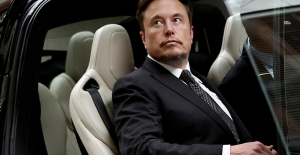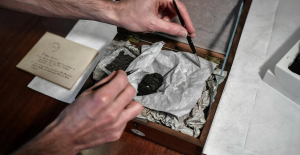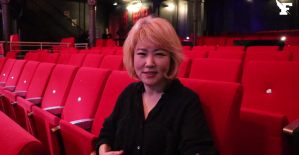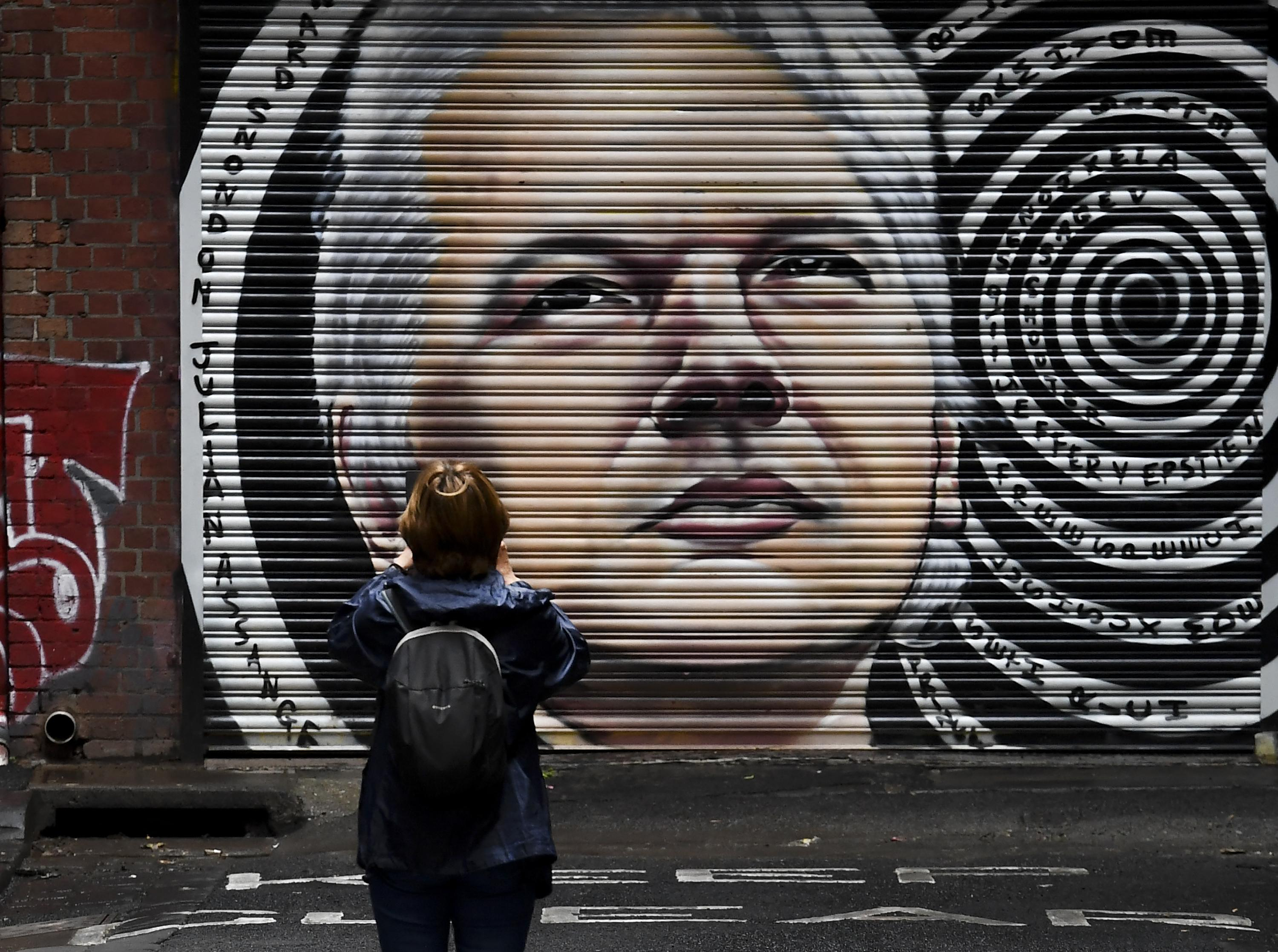“The last chance hearing”. February 20 and 21, 2024 are a crucial date for Julian Assange, his supporters warn. The UK High Court will decide whether the 52-year-old whistleblower's final appeal against his extradition to the United States, where he faces 175 years in prison under the Espionage Act for having revealed, via his organization WikiLeaks, war crimes committed by the United States during the conflicts in Afghanistan and Iraq.
This new court decision, Julian Assange, considered an investigative journalist by his defenders, hacker or spy by his detractors, awaits him in the London prison of Belmarsh, often called the “British Guantanamo”. How did it get there? What is at stake in the court decision expected on Wednesday? A look back at the major stages of an incredible journey at the heart of the debate on press freedom and state secrecy.
First things first, who is Julian Assange, and what is his organization Wikileaks? Passionate about computers from an early age, the young boy who grew up in Townsville, Australia, became a hacker as a teenager. He uses the pseudonym “Mendax” (liar in Latin) to introduce himself, for pleasure, into protected digital networks. This earned him his first setback with the law, when he hacked the Australian server of a multinational telecommunications company. He pleads guilty and is given a light sentence for lack of malicious intent and a difficult childhood. He then studied mathematics, philosophy and neuroscience at six different universities in Melbourne without ever obtaining a degree.
When he founded the WikiLeaks platform in 2006, Julian Assange followed a true philosophy: through new computer means of encryption and hacking, this cyber activist wanted to break the control of information by States, and make it accessible to citizens. This is crypto-anarchism. Any information, however secret it may be, must be able to be disclosed at any time. Wikileaks' secure interface allows documents to be collected by anonymous and encrypted sending, while protecting the source. Any Internet user can send documents there, protected by very strong anonymity - although not infallible, because the Internet always remains tracked. Sending by post is also possible. From the first years, documents revealed the corruption of African heads of state, the activities of Russian offshore companies, cases of espionage and human rights violations perpetrated by States. In 2010, thunderclap. WikiLeaks releases more than 750,000 confidential documents relating to the operating methods of the American army in Iraq and Afghanistan. Army reports, diplomatic telegrams, but also a video showing American soldiers blundering Iraqis and information on the Guantanamo prison. These elements are provided by American military analyst Chelsea Manning, aware that she is in danger of high treason (she will be sentenced to 35 years in prison, but will be released in 2017 thanks to a reduced sentence from President Barack Obama).
For the White House, this operation is a “serious crime”. Washington accuses Julian Assange of having endangered sources of American services. Presidential spokesperson Robert Gibbs speaks of “serious violations of the law” and “a serious threat to those who conduct and assist our foreign policy.” Secretary of State Hillary Clinton speaks of an “attack on the international community”. An investigation for espionage is opened. In 2019, Julian Assange was indicted: he faced up to 175 years in prison.
The cyber activist, for his part, is supported by many very diverse voices, which transcend traditional political divisions. The American right, but also the vast majority of human rights NGOs and journalists' associations, from Amnesty International to Reporters Without Borders, including Daniel Ellsberg himself who, in 1971, had been at the origin of the disclosure of the Pentagon Papers, will defend him in the legal battle that follows.
A few months after these revelations, the head of Wikileaks, who lives in London, found himself the target of another complaint in Sweden. He is accused of rape and sexual assault against two Swedish women for events that occurred in August 2010. The Australian recognizes the relationship, but assures that it was consensual. A European arrest warrant is issued against him.
For the cyber activist, this affair is a set-up to gag him. He nevertheless turned himself in to the British police. Sweden made an extradition request, validated in February 2011. Fearing being sent back to Washington to be tried, Julian Assange went to the Ecuadorian embassy in London in June 2012. He requested political asylum, which was granted to him by the Central American country then led by left-wing figure Rafael Correa, one of his fervent supporters, who also granted him naturalization in 2017.
Then begins a long confinement within the confines of this small diplomatic representation which will last 7 years. The whistleblower continues his activities there. In 2016, from the premises of the embassy, he commented on social networks on the campaign for the American presidential election, while WikiLeaks published thousands of hacked emails from the Democratic Party. The American intelligence services would later say that Russia would have favored these publications, in order to influence the election in favor of Donald Trump, candidate of the Republican Party.
This confinement lasted until 2019, when the new Ecuadorian president, Lenin Moreno, ended the political asylum of Julian Assange (his predecessor Rafael Correa described this gesture as “personal revenge” following the publication by WikiLeaks of an account secret in Panama in the name of the Moreno family). The whistleblower is also deprived of Ecuadorian nationality. Everything then begins: barely out of the embassy, the British police arrest him and throw him into a van. He is being held in Belmarsh high security prison in south-east London.
In February 2020, the legal standoff with British justice began. A year later, she rejected the request for extradition to the United States, due to his “mental health”, while refusing his release on bail. In April 2022, British justice this time ordered extradition to the United States. Julian Assange appeals. Request rejected for the first time by the British High Court in June. This is the issue of Tuesday's decision: if Julian Assange loses this new appeal, all legal remedies will have been exhausted in the United Kingdom to avoid extradition.
The Julian Assange support committee is organizing several rallies this Tuesday, notably in Paris, Strasbourg, Bordeaux, Ajaccio and Nice. For organizations defending press freedom, the case of Julian Assange runs the risk of setting a serious precedent. “Journalist, editor or journalistic source, points of view differ on the status of Julian Assange. But what matters most is why Julian Assange was targeted,” explains Reporters Without Borders (RSF) on its website. For the organization, if Wikileaks is not a newspaper per se, its boss “contributed” to journalism. “The publication by WikiLeaks of classified documents gave rise to numerous articles of public interest throughout the world,” recalls RSF. “The prosecution of which he is the subject (...) would deal an unprecedented blow to freedom of the press.”
Karen Sharpe, author of the book Julian Assange Speaks (Editions Investig'action, 2021), explains that three outcomes are possible on Wednesday. “Either the two judges accept that he appeals, or they do not accept it and that’s serious: he can be extradited within 24 hours! Or they will announce that they need more time to make a decision. If the English and Americans wait until the end of the elections in both countries for the resolution of his appeal - that is to say after January 2025 - things can change in a favorable way for Julian. Donald Trump's son, who is also his adviser, said his father would be in favor of dropping the charges. Vivek Ramaswamy, a former candidate who called for voting for Trump, also took this position, as did three Democratic candidates.
In the meantime, what happens to Wikileaks? The drying up of funding, the imprisonment of its boss and the surveillance of the American government have dried up the activity of the organization. “It’s not a big company, but people like you and me who raised money to make it work,” emphasizes Karen Sharpe. This is also the issue of his release: that WikiLeaks continues its action.”

 B:SM will break its investment record this year with 62 million euros
B:SM will break its investment record this year with 62 million euros War in Ukraine: when kyiv attacks Russia with inflatable balloons loaded with explosives
War in Ukraine: when kyiv attacks Russia with inflatable balloons loaded with explosives United States: divided on the question of presidential immunity, the Supreme Court offers respite to Trump
United States: divided on the question of presidential immunity, the Supreme Court offers respite to Trump Maurizio Molinari: “the Scurati affair, a European injury”
Maurizio Molinari: “the Scurati affair, a European injury” Irritable bowel syndrome: the effectiveness of low-carbohydrate diets is confirmed
Irritable bowel syndrome: the effectiveness of low-carbohydrate diets is confirmed Beware of the three main sources of poisoning in children
Beware of the three main sources of poisoning in children First three cases of “native” cholera confirmed in Mayotte
First three cases of “native” cholera confirmed in Mayotte Meningitis: compulsory vaccination for babies will be extended in 2025
Meningitis: compulsory vaccination for babies will be extended in 2025 When traveling abroad, money is a source of stress for seven out of ten French people
When traveling abroad, money is a source of stress for seven out of ten French people Elon Musk arrives in China to negotiate data transfer and deployment of Tesla autopilot
Elon Musk arrives in China to negotiate data transfer and deployment of Tesla autopilot Patrick Pouyanné, CEO of TotalEnergies, is very reserved about the rapid growth of green hydrogen
Patrick Pouyanné, CEO of TotalEnergies, is very reserved about the rapid growth of green hydrogen In the United States, a Boeing 767 loses its emergency slide shortly after takeoff
In the United States, a Boeing 767 loses its emergency slide shortly after takeoff A charred papyrus from Herculaneum reveals its secrets about Plato
A charred papyrus from Herculaneum reveals its secrets about Plato The watch of the richest passenger on the Titanic sold for 1.175 million pounds at auction
The watch of the richest passenger on the Titanic sold for 1.175 million pounds at auction Youn Sun Nah: jazz with nuance and delicacy
Youn Sun Nah: jazz with nuance and delicacy Paris Globe, a new international theater festival
Paris Globe, a new international theater festival Skoda Kodiaq 2024: a 'beast' plug-in hybrid SUV
Skoda Kodiaq 2024: a 'beast' plug-in hybrid SUV Tesla launches a new Model Y with 600 km of autonomy at a "more accessible price"
Tesla launches a new Model Y with 600 km of autonomy at a "more accessible price" The 10 best-selling cars in March 2024 in Spain: sales fall due to Easter
The 10 best-selling cars in March 2024 in Spain: sales fall due to Easter A private jet company buys more than 100 flying cars
A private jet company buys more than 100 flying cars This is how housing prices have changed in Spain in the last decade
This is how housing prices have changed in Spain in the last decade The home mortgage firm drops 10% in January and interest soars to 3.46%
The home mortgage firm drops 10% in January and interest soars to 3.46% The jewel of the Rocío de Nagüeles urbanization: a dream villa in Marbella
The jewel of the Rocío de Nagüeles urbanization: a dream villa in Marbella Rental prices grow by 7.3% in February: where does it go up and where does it go down?
Rental prices grow by 7.3% in February: where does it go up and where does it go down? Even on a mission for NATO, the Charles-de-Gaulle remains under French control, Lecornu responds to Mélenchon
Even on a mission for NATO, the Charles-de-Gaulle remains under French control, Lecornu responds to Mélenchon “Deadly Europe”, “economic decline”, immigration… What to remember from Emmanuel Macron’s speech at the Sorbonne
“Deadly Europe”, “economic decline”, immigration… What to remember from Emmanuel Macron’s speech at the Sorbonne Sale of Biogaran: The Republicans write to Emmanuel Macron
Sale of Biogaran: The Republicans write to Emmanuel Macron Europeans: “All those who claim that we don’t need Europe are liars”, criticizes Bayrou
Europeans: “All those who claim that we don’t need Europe are liars”, criticizes Bayrou These French cities that will boycott the World Cup in Qatar
These French cities that will boycott the World Cup in Qatar MLS: new double for Messi who offers victory to Miami
MLS: new double for Messi who offers victory to Miami PSG-Le Havre: Ramos on his way, Kolo Muani at the bottom of the hole… Favorites and scratches
PSG-Le Havre: Ramos on his way, Kolo Muani at the bottom of the hole… Favorites and scratches Football: Vasco da Gama separates from its Argentinian coach Ramon Diaz
Football: Vasco da Gama separates from its Argentinian coach Ramon Diaz F1: for the French, Ayrton Senna is the 2nd best driver in history ahead of Prost
F1: for the French, Ayrton Senna is the 2nd best driver in history ahead of Prost

















